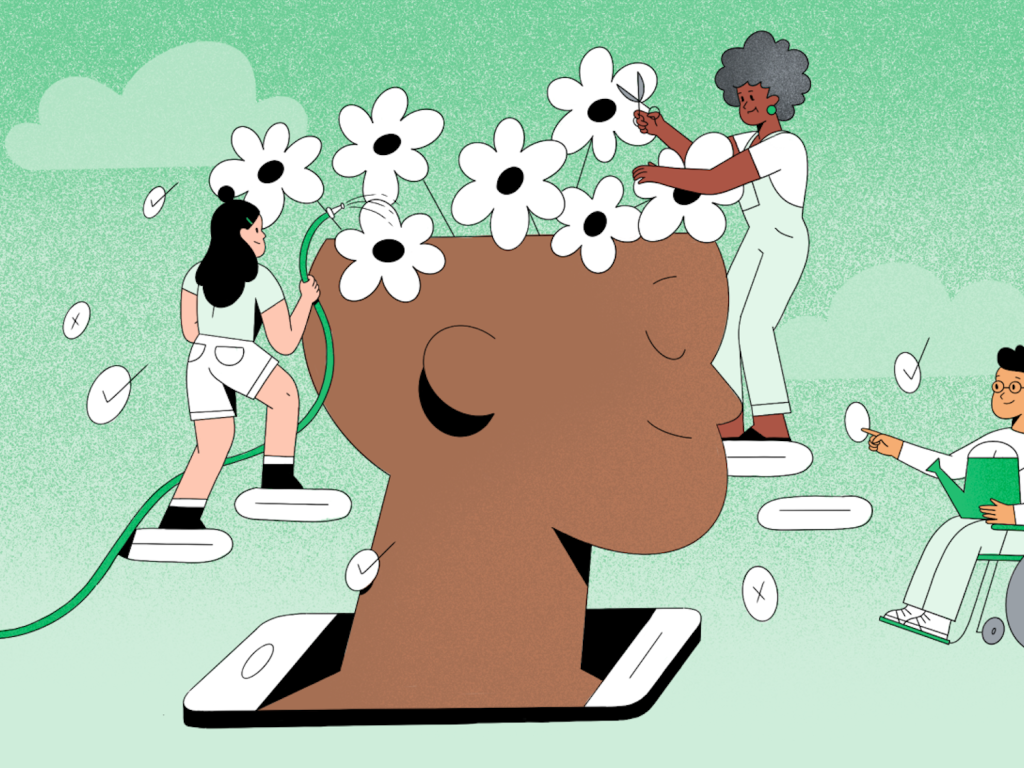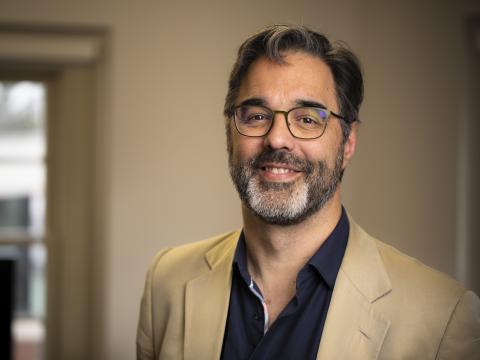
A UO-led study of Android users investigates the effects of smartphone use on mental and physical well-being.
How exactly do we use our smartphones? What patterns of smartphone use promote and detract from well-being? Who is most vulnerable to the harmful effects of smartphone use? These are the questions University of Oregon digital mental health researcher Nick Allen is trying to answer in a new research study, launching at the end of this week.
US residents between the ages of 18 and 80 with an Android phone can participate in a four-week study that will measure how people use their phones, alongside well known measures of well-being. Participants who also have a Fitbit device will have the option to contribute additional measures of well-being, like daily step count (Fitbit may analyze this data to improve certain device features).
And no, the irony that research on how smartphones can affect our well-being is conducted via smartphones isn’t lost on us.
Where Mental Well-being and Technology Intersect
Anecdotally, much has been said about how our digital experiences might be affecting our mental health. The flipside is that smartphones also allow us to create and maintain relationships with people globally and learn new things at astonishing rates. They’ve certainly changed society in profound and important ways, but parents, educators, legislators and policymakers don’t have a clear understanding of how to mitigate their risks. Do the positives outweigh the negatives?
This is a question that doesn’t address the realities of today’s world — like cars, which are extremely useful but cause pollution and traffic accidents, the smartphone is here to stay. And because it’s not going anywhere, we need to understand how this technology affects our well-being to create a world where there is a clear understanding of both the benefits and risks. By identifying the factors that drive the risks, we can help create a safer and more positive experience — creating innovations to smartphone tech similar to safety measures like airbags and seatbelts and electric vehicles that curb pollution.
Beyond Screen Time: How Do Smartphones Factor Into Our Overall Well-being?

Nick Allen, director of the Center for Digital Mental Health, and colleagues at the University of Oregon, track and analyze digital behavior with the goal of detecting how that behavior might affect mental health. Understanding potentially harmful habits may unlock the ability to develop adaptive, personalized interventions that are delivered when users need them most.
“We need high quality research to identify which patterns of smartphone use are associated with benefits versus risks, and who is more likely to experience harmful versus beneficial outcomes,” Allen said. “Answering these questions is necessary so that we can pursue evidence-based product design, education and policy aimed at maximizing benefits and minimizing risks.”
With a participant’s informed consent, the Digital Well-being Study will collect measures of phone usage, like the number of unlocks each day, and time spent in different categories of apps. Rather than relying on self reports, which can be skewed, these data will be collected objectively via the Google Health Studies App. The study will use the smartphone to directly measure many of the well-established building blocks of well-being, such as sleep, physical activity and time spent at home and work or other locations each day.
The study supports optional data sharing by consent through Fitbit, to allow for additional measurement of well-being constructs like heart rate.
Contribute to Research That Improves Human Well-being
The study takes four weeks to complete and is open for enrollment to US-based Android users between the ages of 18 and 80. The study will remain open for one year or when 14,000 participants have been recruited, whichever happens first. If participants follow through with 60% of the study procedures, they may be compensated $50 for their contribution.
This type of data collection and analysis democratizes health-related research because of how easy it is to participate and isn’t restricted by proximity to a lab. Built into the fabric of the study is the importance of a representative sample of the U.S. population.
“It's critical that we include data from people historically underrepresented in these kinds of studies,” Allen said. “We have prioritized recruitment goals to ensure we can support research, and potential solutions, that support everyone in our society and not just the ‘usual suspects.’”
That technology impacts our lives is inescapable. But by directly measuring how our digital interactions and habits contribute to our well-being, we can take the first steps toward ensuring that using our devices is a positive experience.
Interested in contributing to research about how patterns of smartphone use are associated with measures of mental and physical well-being? Download the Google Health Studies App and sign up this week.
Center for Digital Mental Health
The Center for Digital Mental Health conducts research and builds digital tools to enhance mental health, especially among underserved groups and young people. The center partners with and empowers users by providing them — and their clinicians, families and support networks — with accurate, actionable feedback on their mental health using mobile and wearable devices and social media.
The center’s current research projects include interventions for postpartum depression, a smoking cessation program, promoting healthy adolescent relationships with social media, and detecting changes in stress levels.
Data collected by the center is managed according to strict ethical standards and will only be used for research and for building better products. It will never be sold on or used for advertising.
Mental Health During Life Transitions
Nick Allen focuses on how transitions between life stages, such as from adolescent to adults, are often when mental health problems emerge. Allen’s work aims to develop personalized interventions to help people feel more themselves again using devices to unobtrusively track and analyze behavior.
Allen has partnered with newly released NatureDose, a new app developed at the UO that uses technology to help users quantify their time in nature and maximize the benefits. Essentially, it’s a prescription for nature delivered through a smartphone.
Allen is also the co-founder of Ksana Health, a company whose mission is to use research evidence and modern technology to revolutionize the delivery of mental health care through remote behavioral monitoring and adaptive, continuous behavior change support.
Protecting Privacy and Trust
To protect privacy and trust, all prospective study participants complete a comprehensive digital consent flow that has been approved by the University of Oregon’s Institutional Review Board for research ethics, before enrolling in the study and sharing any data. This flow clearly and succinctly emphasizes the major factors to consider before enrolling, including how Google Health Studies protects the study data, and a summary of risks and benefits.
To finish enrolling, prospective participants complete a short quiz to confirm their understanding of this flow before signing an informed consent form.
These consent records are kept separate from any other study data, and the very few people who could access these records (which is needed for regulatory purposes) do not have access to the smartphone and wearable data.
